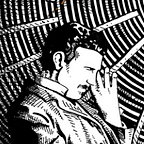Each month, Alternating Current Press presents an ekphrastic challenge for writers and lovers of history: We feature a different public domain historical photograph, and ask writers to respond to it. There is no wrong answer, and no set style guidelines. Poetry, prose, hybrid, fiction or non, experimental — Anything goes that has a history bent. All work is considered for our Charter Oak Award for Best Historical and for publication in our annual Footnote: A Literary Journal of History (only if selected), and the best responses will be published on The Coil the following month. Check out our homepage for your chance to participate in the December DaguerreoTyped historical ekphrastic challenge, and read all of the past archives here.
We present to you: the featured responses to DaguerreoTyped #8! Enjoy!
“Flight and Other Impossibilities”
By Gretchen Rockwell
“We knew that men had by common consent adopted human flight as the standard of impossibility. When a man said, ‘It can’t be done; a man might as well try to fly,’ he was understood as expressing the final limit of impossibility.”
—Wilbur Wright
Most of the time, Ira doesn’t think about the plane
his father built. The fragile-thick fabric of the arching
wings, like the heavy silk of his mother’s best napkins
brought out three times a year, the sturdy bones of the
frame and the delicate strands of the wheel. Most of the
time he thinks about the way Millie and Ann and Ida
(most of all Ida) are starting to look at him and laugh
behind their hands when he catches them staring.
He thinks about the braid of Ida’s glossy hair, almost
his shade of brown, like the sod he can’t remove from
under his ragged nails, the color of potential. Her eyes
aren’t anything like his. His father never lets him fly
the plane, and most of the time he doesn’t feel the loss,
the ugly gap of being too old to go up on his father’s lap,
that first terrible glory of being up in the blue, with the
rattle of the plane around their bodies, the pure dissonance
of flight, and not yet old enough to go up alone, where the
dissonance of his body is meaningless to clouds. The plane
itself is imperfect, but he loves it. The sanded poles and the
smooth of fingers over them to check for splinters, the texture
of the wood like Ida’s smooth cheeks or Mavis advertisements.
The care and precision of wrapped lines, like his mother’s deft
hand in the mirror applying the bold carmine stain, the slow
press and pucker and perfect cupid-bow smile that results,
smile singing like the finely tuned wires between the pedals
and the wings, the whole unified grace of it. Ira watches
his father behind the thick wooden wheel, the rough knuckles
and wiry forearms so very like his own, and scrubs an invisible
mustache away. His mother clucks over his tightening shirts,
how fast he’s growing, the mismatched scraps she has to use
to mend the holes, and he doesn’t say anything, just wonders
if eating more corn will return the cushion over the bones of his
ribs and hips, the fat that felt like safety and his mother’s arms,
sweet like Christmas oranges. His father told him to keep the
biplane’s name a secret from his mother. Ruthann, Ira murmurs
to it one day, Ruthann, one day I’ll fly again. Maybe, he thinks,
maybe he’ll take Ida up, her hair so close to his own, the only
dissonance the one letter separating their names, her softness
mirrored in his hands, the simple delight of her dress, their
bodies so close they could be the same one, up there in the sky.
Gretchen Rockwell lives and works in Rhode Island as a Supplemental Instructor of English at the Naval Academy Preparatory School. She enjoys writing poetry about gender and sexuality, space, and unusual connections. This is her first publication.
“Ten”
By Peter Velsor
They say you can’t teach an old dog new tricks —
but a bird, maybe.
Old name, old face, old ways, old habits,
new light, new air, new touch: the clouds.
First it was the elegant French, their hot fire burning the cold air,
(their culottes, their frocks, their wigs held tightly to their bodies under a canopy)
and then came the industrial revolution and its industrial dreams:
to roar, to perfume the sky with gasoline, to drop bombs,
to win wars, to win hearts, to win minds, and to
touch down so gently not even the grass would object.
Running his hands over the wooden wheel, Glenn tries to imagine it.
Ten minutes in the air, ten minutes of freedom, ten minutes where
the tax man, his wife, her mother, and all those round, ground people
cannot touch him.
The sky the limit, the future isn’t worth the thought:
Men to Europe in 33 hours, then in three,
then the moon and its hopeful eyes,
his namesake missiles or the fire in his belly.
He fixes his laces, he fixes his tie, he fixes his gaze:
tomorrow, the newspapers will tell everyone that he is the fastest man in the world.
Peter Velsor is the pen name of a New York-based poet who has previously been published in The New York Times, The Washington Post, Los Angeles Times, Buzzfeed, and Chicago Tribune, with artistic work featured in the permanent collection of the Smithsonian Institution in Washington, D.C.
